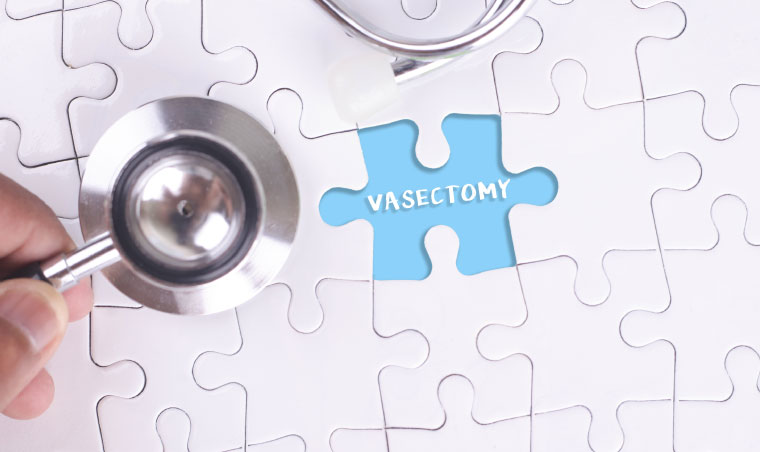Vasectomy: Safe, Effective And Permanent Birth Control Method
By Dr. Nikita Toshi +2 more

Get,

to manage your symptom
Get your,


4 Cr+ families
benefitted

OTP sent to 9988776655



You’ve successfully subscribed to receive
doctor-approved tips on
Whatsapp

Get ready to feel your best.

Hi There,



Register to Avail the Offer
Send OTPBy continuing, you agree with our Privacy Policy and Terms and Conditions

Hi There,

Trusted by 4 crore+ families

OTP sent to 9988776655



You have unlocked 25% off on medicines




Code: NU25

By Dr. Nikita Toshi +2 more
Table of Contents
With the exception of abstinence, vasectomy is the most affordable and effective method of birth control. Explained simply, vasectomy is male sterilisation by cutting or sealing the tubes that carry the male sperm. This prevents the sperm from being ejaculated and fertilises the female egg.

Couples who definitely do not desire any more children in fthe uture find an effective and safe vasectomy method. Vasectomy is a method of birth control which men can opt for and has several pluses in its favour.
· It eliminates the need for any other birth control measures before sex.
· It is an almost 100% effective step in preventing pregnancy.
· It needs an outpatient or in-clinic surgery of about 30 minutes.
· The risk of side effects and complications is minimal.
· Vasectomy is cheaper than female sterilisation (tubal ligation).
· It is also cheaper than the long-term cost of birth control medications.
A vasectomy procedure is performed to cut through and close off the ends of the two tubes that carry sperm through to the semen. These tubes are known as vas deferens and hence the name vasectomy. The procedure prevents the sperm from mixing with the semen and getting released when a man ejaculates during sexual intercourse.

Vasectomy may be done as an outpatient procedure or even in the doctor’s office. A shot of local anaesthesia is used to numb the skin of the scrotum. An opening is made in your skin by the surgeon. The vas deferens, i.e. the sperm tubes are grasped, one at a time and cut. After that, the sperm tube ends are either tied, clipped or cauterised. Then the doctor will return the ends of the vas deferens to the scrotum. There will be some numbness and discomfort in your scrotum from vasectomy for a few hours to days. In a few instances, some men have reported a feeling of a slight “tugging” sensation. Some have reported a feeling of things moving around. The scrotum incision may or may not require stitches depending on the surgeon’s expertise in executing the procedure.
The surgery may be done in two ways. One is the conventional method of using the scalpel to cut. An alternative, less intrusive “no scalpel” technique is adopted. This method uses a small puncture in the scrotum instead of an incision. The remaining parts of the procedure are identical for both.
Usually, vasectomy is done only after dialogue and consultation with the surgeon/urologist. The discussions, queries and dialogue will centre around:-
· Understanding the permanent nature of vasectomy.
· Establishing whether you do not truly desire to father a child in the future.
· Knowing about your present children and their health condition.
· The feelings of your partner about the decision.
· Alternatives available to you for birth control.
· The procedures and requirements for vasectomy surgery
· Your medical condition, i.e. allergies, blood disorders, skin disease involving the scrotum, earlier urological surgeries, repeat infections in your genitals etc.
· The recovery process after the surgery.
· Possible complications.
· You must sign a consent form after fully knowing all the issues discussed.

Your preparation for a vasectomy surgery calls for certain preparations at your end. You are likely to be instructed to:-
· Shave off all hair from your scrotum right up to the top of your penis, either the night before or on the morning of your surgery.
· Give a thorough wash to your scrotum the night before and on the morning of the surgery. This is to avoid the chance of infection.
· Take prescribed pre-operative medicines, if any, at prescribed hours before the surgery.
· Eat, but avoid heavy food before the surgery. Light food and fluids are best.
· Carry a clean athletic supporter or a pair of tight, supportive shorts with you.
Use an alternative form of birth control until your doctor confirms there are no sperm in your semen.
A vasectomy procedure will have bruising, swelling and pain for a few days. You will be instructed to adhere to a few restrictions by your doctor while you get discharged after the surgery. You are likely to be told to:-
· Keep your scrotum supported with a bandage and tight-fitting underwear for at least 48 hours after your operation.
· Apply ice packs to your scrotum for two days after surgery.
· Abstain from any sexual activity for a week or so.
· Contact your doctor immediately if you develop redness, worsening your pain or swelling or have blood oozing from the site of the surgery. These are signs of infection.
Also Read: Does Boric Acid Kill Sperm? Unraveling the Facts and Myths

Vasectomy is one of the safest procedures. Side effects or complications are rare. In rare instances, one may develop complaints regarding:-
· A chronic pain.
· A dull ache that worsens at ejaculation. This is due to fluid building up in the testicle.
· Inflammation. This occurs due to leaking sperms. Development of an abnormal cyst in the small coiled sperm tube located on the upper testicle.
· Swelling of the scrotum caused by a sac filled with fluid surrounding a testicle. This is medically termed hydrocele.
Also Read: Benefits of Getting Off Birth Control: A Research-Based Overview
Ans: No. Other than preventing pregnancy, vasectomy does not affect sexual performance in any way. Ejaculation happens as usual and there is no loss in sexual appetite and satisfaction.
Ans: No. There is no risk or damage to any sexual organ like the penis, testicles or other parts of the reproductive system from vasectomy.
Ans: No. There is no serious pain associated with vasectomy. There will be minor pain or tugging or pulling felt during surgery. After surgery, in almost all cases, minor pain will persist for a few days before disappearing.
Ans: There is no proven connection or linkage between vasectomy and testicular or prostate cancer.
Ans: Yes, vasectomy may be reversed. It is, however, a more difficult and time-consuming process.
Ans: No. It does not prevent sexually transmitted diseases. A condom will be necessary to protect against STDs.
Ans: There is no proven link between heart disease and vasectomy.
Disclaimer: The information included on this site is for educational purposes only and is not intended to be a substitute for medical treatment by a healthcare professional. Because of unique individual needs, the reader should consult their physician to determine the appropriateness of the information for the reader’s situation.

Leave your comment...
Comments